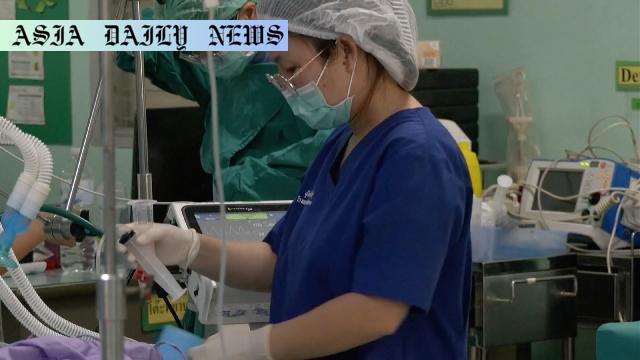USAID: Medical treatment for displaced Myanmarese halted due to US aid freeze, impacting 29,000 individuals in Thai camps.
USAID has frozen foreign aid due to an executive order by President Trump.
Medical facilities funded by USAID in Thailand are shutting down, affecting 29,000 displaced Myanmarese refugees.
Essential healthcare services and emergency transfers have ceased, risking lives.
Neighboring hospitals are overwhelmed with affected patients due to funding cuts.

Introduction to the USAID Freeze
The temporary halt of foreign aid by the United States, under an executive order signed by President Donald Trump, is having severe humanitarian implications. The suspension, which allows a 90-day reevaluation period, has led to the freezing of assistance programs managed by the US Agency for International Development (USAID). This decision is notably impacting medical support for displaced individuals from Myanmar living in Thai camps.
The Scope of the Impact
One prime victim of the aid freeze is a USAID-funded medical center operating in the northwestern region of Thailand, near the Myanmar border. This facility previously served as a lifeline for displaced families and individuals fleeing the destruction within their home country. Thai media reports confirm its closure, which has left local hospitals scrambling to address the healthcare needs of the 29,000 refugees who inhabit the camp.
Healthcare Challenges in the Camps
Displaced Myanmarese refugees already face tremendous challenges within the camps. Access to adequate healthcare, among the most critical of these, has now become a dire issue since the USAID-funded programs have been paused. A Japanese doctor working with emergency transfer efforts highlighted that the lack of funding has halted life-saving evacuations of severely injured individuals to better-equipped hospitals. Such disruptions are life-threatening for many vulnerable patients who rely on these medical services.
Overwhelmed Local Hospitals
With the closure of camp-based medical support, hospitals located near the border have had to take on the burden of treating refugees. These healthcare facilities are often ill-prepared to handle the sheer volume of patients, many of whom require extensive care. The sudden influx of injured or severely ill individuals strains both infrastructure and staff resources in these hospitals.
Broader Implications of the Aid Suspension
The implications of the USAID freeze extend beyond healthcare. Displaced individuals in these camps face a multitude of interconnected issues, such as poor nutrition, mental health challenges, and unsanitary living conditions. The withdrawal of foreign aid compounds these hardships, threatening to exacerbate already dire circumstances.
The Call for Reevaluation
The executive order’s aim to reevaluate foreign aid programs has drawn both praise and criticism internationally. Proponents argue that the freeze ensures US funds are used effectively, while critics counter that pausing essential life-saving programs does more harm than good. Many humanitarian organizations are urging the US government to expedite its reevaluation process to restore funding quickly for critical initiatives like the one in Thailand.
Humanitarian Concerns and Future Outlook
As thousands continue to languish in refugee camps, international aid organizations and governments must step in to mitigate the crisis. Cooperation between various entities could provide temporary relief until USAID programs are reinstated. The current situation reflects the fragility of heavily aid-dependent systems and the consequences of abrupt funding changes.
Conclusion
The USAID freeze serves as a stark reminder of the interconnectedness of global aid programs and the lives they impact. For the 29,000 individuals residing in Thai camps, the consequences of this funding suspension are not abstract – they are tangible, immediate, and devastating. As the reevaluation process unfolds, it is critical for decision-makers to prioritize the urgency of healthcare solutions and their far-reaching effects among vulnerable populations worldwide.
Commentary
The Human Cost of the USAID Freeze
The suspension of USAID funding might have been a policy decision rooted in caution, but its real-world implications are sobering. Refugees who have already endured unimaginable strife now face another hurdle in the form of reduced access to essential care. It is a painful irony that people fleeing conflict must now fight for survival due to disrupted healthcare services brought about by a reevaluation of aid priorities.
Healthcare as a Lifeline
In situations like these, healthcare is more than a service; it is hope. The displaced Myanmarese are already navigating the trauma of losing their homes and loved ones. For many, the medical centers funded by USAID were their only source of relief from physical and mental suffering. The abrupt halt of these services adds another layer of despair to their already precarious lives.
Global Responsibility
The situation should serve as a call to action for the international community. While countries may prioritize their national interests, the interconnectedness of the modern world necessitates a shared sense of responsibility for vulnerable populations. Whether through financial support or resource-sharing, other nations must step in to fill the void left by the USAID freeze.
The Path Forward
The United States must reevaluate its aid policies with both caution and urgency. Lives are at stake, and every delay in reinstating assistance risks further tragedy. Policymakers must balance the need for accountability with the moral imperative of offering relief to those in desperate need. Restoring these programs is not just about fulfilling obligations; it is about reaffirming the value of human life.


